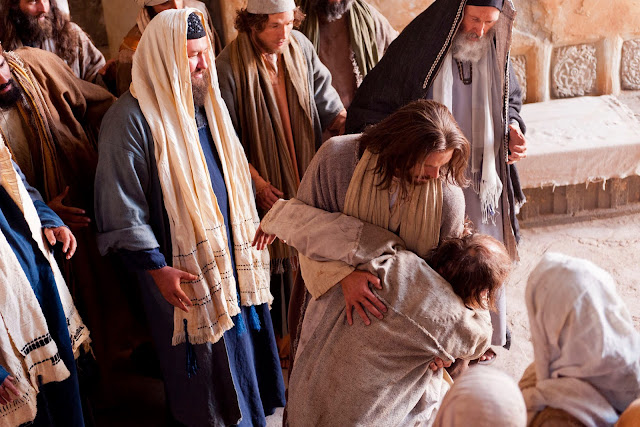“Then a demon-possessed man, who was blind and couldn’t speak, was
brought to Jesus. He healed the man so that he could both speak and see. The
crowd was amazed and asked, ‘Could it be
that Jesus is the Son of David, the Messiah?’” (Matthew 12:22-23, NLT).
Healing is one of Jesus’ most prominent acts of
ministry. He healed those with
physical needs: lameness, blindness, and so on. He healed some who were
troubled by a demonic presence, as in today’s passage. And Jesus helped those
who needed spiritual healing: forgiveness of sin, cleansing of the soul,
restoration of wholeness. Mark 2:1-12 shows Jesus healing people physically to
demonstrate that he could also heal people spiritually.
No one talks much about
demons today. (Maybe in the East Malaysia we’re quite familiar with these kind
of talks. I think the West in the cities probably a bit difficult to imagine). Talks
of demons is interpreted as primitive ignorance combined with a barely hidden
fear that such an obvious display of evil would be terrifying. Some people
chalk up all reported demonic activity to a simplistic view of reality that
explains all natural phenomena in spiritual terms. But insisting that
everything can be explained naturalistically eventually strips life of any
meaning beyond chemical reactions. The Bible takes a more realistic approach by
describing life experiences in real terms. The human writers (of the Bible)
understood demons to be as much of the natural (fallen) order as any one of
many items that can’t be seen (gases, love, light) but are still real.
In today’s passage, we
glimpse an encounter between Jesus and demonic powers that had incapacitated a
man’s sight and speech. This man with normal eyes and vocal cords couldn’t use
them because a demon prevented him. Jesus’ impulsion of the demon freed this
man to engage the world. Imagine for a moment the helplessness of blindness and
muteness. This man “was brought to Jesus”;
he didn’t find his own way. His whole experience is a teaching case for us of
the incapacitating effects of sin and the wonderful ways God heals us.
Think about this: Jesus’ desire to heal others clearly
demonstrated his compassion. His healing helped bring isolated people back into
community. He urges us to show compassion toward others by praying for
healing or bringing a healing word to those who are hurting. Do these and let
people consider Jesus who is living in you by asking, “Could it be that Jesus is the Son of David, the Messiah?”
For only Jesus can save, but we can make people ready to welcome Jesus in their
life by preparing “the way… make ready
the way of the Lord, make his paths straight” (Mark 1:2-3) through
healing – physically and spiritually – the helpless. Pray.
THINK BIG.
START SMALL. GO DEEP.


























